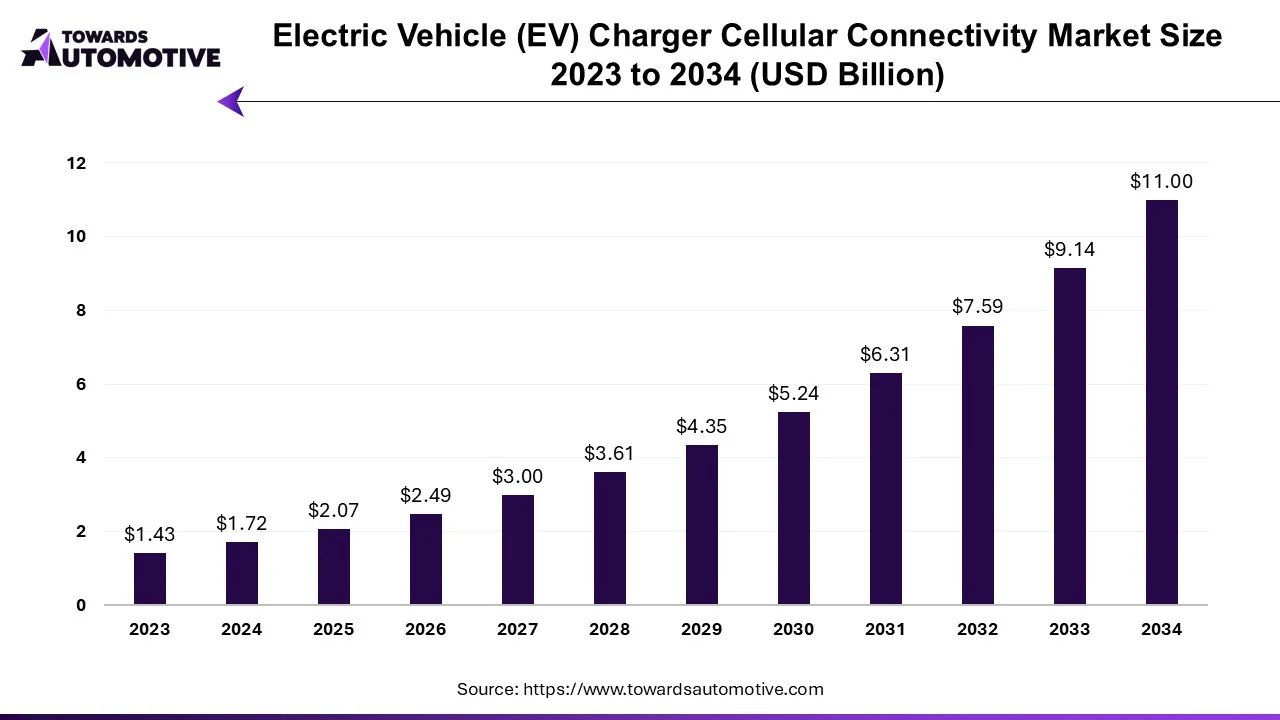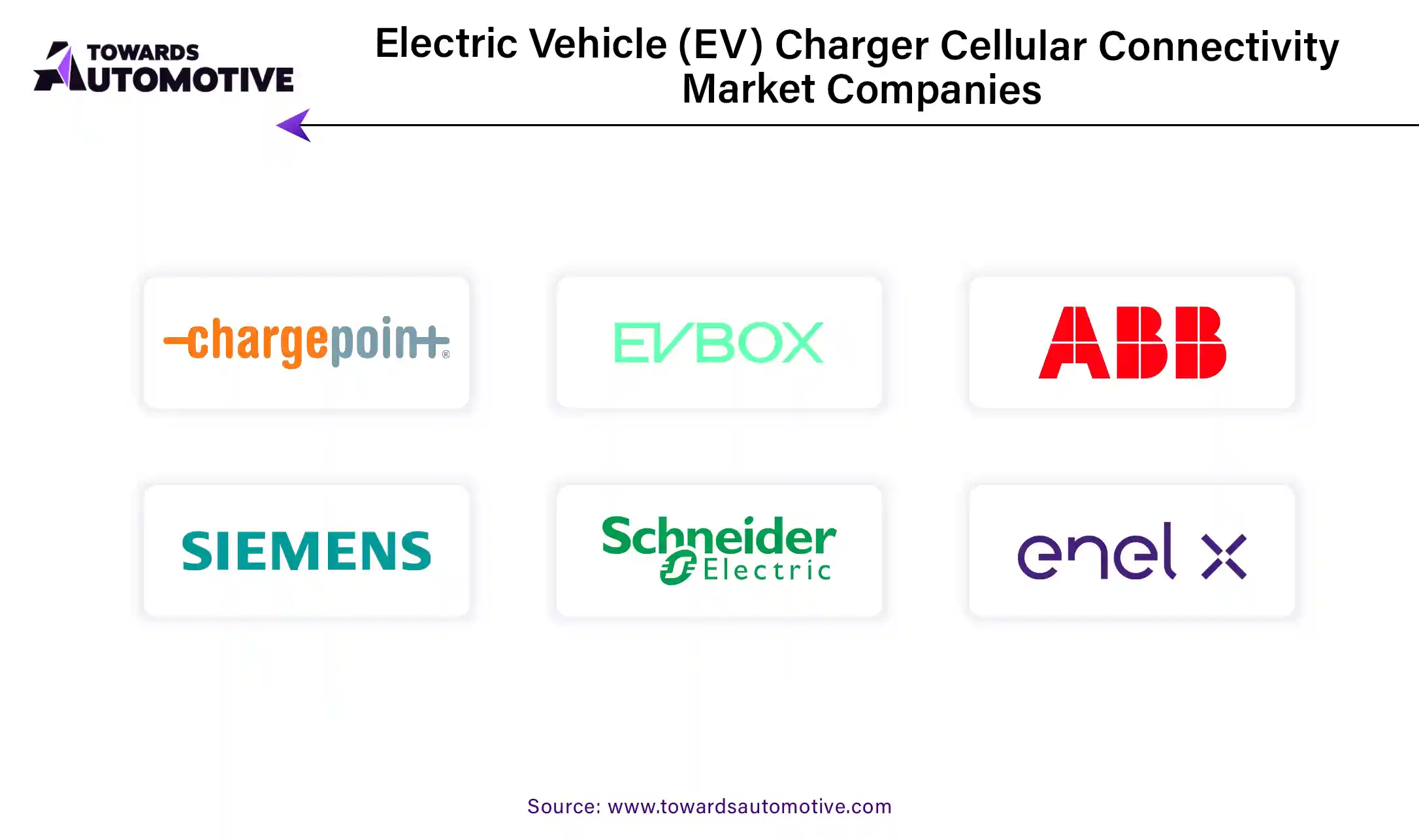Electric Vehicle (EV) Charger Cellular Connectivity Market Insights and Trends
The electric vehicle (EV) charger cellular connectivity market is forecasted to expand from USD 2.07 billion in 2025 to USD 11.00 billion by 2034, growing at a CAGR of 20.38% from 2025 to 2034.

The electric vehicle (EV) charger cellular connectivity market is experiencing remarkable growth, driven by the global transition towards electric mobility, advancements in connectivity technologies, and the increasing demand for efficient charging infrastructure.
Empowering Electric Mobility
EV charger cellular connectivity plays a crucial role in enabling convenient, reliable, and intelligent charging solutions for electric vehicles, facilitating remote monitoring, data analytics, and energy management capabilities. Cellular connectivity allows EV chargers to communicate with central management systems, cloud platforms, and mobile applications, providing real-time status updates, billing information, and remote access for EV drivers, operators, and grid operators. By leveraging cellular networks, EV chargers offer enhanced interoperability, scalability, and efficiency, supporting the transition towards electric mobility and sustainable transportation solutions.
Key Components and Features of EV Charger Cellular Connectivity
- Charging Infrastructure: Providers Leading providers in the EV charger cellular connectivity market offer a range of charging solutions, including Level 2 AC chargers, DC fast chargers, and wireless charging systems, equipped with cellular modems, GPS modules, and communication protocols for remote monitoring and control. These providers collaborate with cellular network operators, software developers, and EV manufacturers to deliver interoperable, future-proof charging infrastructure solutions for residential, commercial, and public charging applications.
- Cellular Modems and Communication Protocols: Cellular modems enable EV chargers to connect to cellular networks, transmit data securely, and communicate with backend systems, allowing operators to monitor charger status, manage charging sessions, and optimize network performance remotely. EV charger cellular connectivity solutions support various communication protocols, including OCPP (Open Charge Point Protocol), OCPI (Open Charge Point Interface), and OCPP-J (OCPP for Japan), ensuring interoperability and compliance with industry standards for EV charging infrastructure.
- Smart Grid Integration and Demand Response: EV charger cellular connectivity enables seamless integration with smart grid systems, demand response programs, and energy management platforms, allowing utilities to optimize grid operations, balance supply and demand, and mitigate grid congestion during peak charging periods. Cellular-enabled EV chargers support bidirectional communication, load balancing, and dynamic pricing schemes, enabling grid operators to incentivize off-peak charging, manage grid constraints, and maximize renewable energy utilization for EV charging.
Market Dynamics and Trends
- Government Incentives and Policies: Government incentives, subsidies, and regulatory mandates drive the deployment of EV charger cellular connectivity infrastructure, promoting electric vehicle adoption, reducing greenhouse gas emissions, and achieving climate targets. Countries and regions worldwide implement policies such as zero-emission vehicle mandates, tax credits for EV charging infrastructure, and funding programs for EV charging networks, stimulating investment in cellular-enabled charging solutions and accelerating the transition towards sustainable transportation systems.
- Technological Advancements in Cellular Connectivity: Technological advancements in cellular connectivity, including 5G networks, LTE-M (Long-Term Evolution for Machines), and NB-IoT (Narrowband Internet of Things), enhance the performance, reliability, and coverage of EV charger cellular connectivity solutions. Cellular network operators invest in infrastructure upgrades, spectrum allocation, and network densification to support the growing demand for connected devices, IoT applications, and smart city initiatives, enabling seamless communication between EV chargers, vehicles, and backend systems.
- Data Analytics and Predictive Maintenance: EV charger cellular connectivity enables data analytics, predictive maintenance, and remote diagnostics capabilities, allowing operators to monitor charger performance, detect faults, and proactively address maintenance issues to minimize downtime and ensure optimal charging station availability. Machine learning algorithms, AI-driven analytics platforms, and cloud-based software solutions analyze charging data, identify usage patterns, and optimize charging infrastructure deployment, enhancing customer experience, reducing operating costs, and maximizing ROI for EV charger operators.
Global Trends and Market Outlook
- North America Leads EV Charger Cellular Connectivity Market: North America emerges as the largest market for EV charger cellular connectivity, driven by factors such as government initiatives, electric vehicle adoption rates, and technological innovation. The United States and Canada invest in EV charging infrastructure deployment, smart grid integration, and connectivity solutions to support the growing demand for electric mobility and achieve climate goals, positioning the region as a key hub for EV charger cellular connectivity innovation and deployment.
- Europe Accelerates Electric Mobility Transition: Europe witnesses significant growth in the EV charger cellular connectivity market, fueled by regulatory initiatives, industry partnerships, and investments in sustainable transportation infrastructure. Countries like Germany, the United Kingdom, and Norway prioritize electric vehicle charging network expansion, interoperability standards, and renewable energy integration to facilitate cross-border travel, promote EV adoption, and reduce carbon emissions, driving demand for cellular-enabled charging solutions and smart grid technologies.
- Asia-Pacific Drives Innovation in Electric Mobility: Asia-Pacific presents vast opportunities for the EV charger cellular connectivity market, driven by factors such as urbanization, population growth, and government support for electric mobility initiatives. Countries like China, Japan, and South Korea invest in EV charging infrastructure deployment, smart city development, and connectivity solutions to address air pollution, traffic congestion, and energy security challenges, creating a conducive environment for cellular-enabled charging solutions and IoT-based transportation systems to thrive and transform the urban mobility landscape.
Challenges and Opportunities
- Interoperability and Roaming Agreements: Interoperability standards and roaming agreements pose challenges to EV charger cellular connectivity deployment, as different charging networks, communication protocols, and backend systems require seamless integration and compatibility for EV drivers to access charging services across regions and networks. However, opportunities lie in industry collaboration, standardization efforts, and regulatory frameworks that promote open access, interoperability, and roaming agreements for EV charging infrastructure, enhancing user experience and accelerating market growth.
- Cybersecurity and Data Privacy: Cybersecurity threats and data privacy concerns present challenges to EV charger cellular connectivity deployment, as connected charging infrastructure, mobile applications, and backend systems are susceptible to hacking, data breaches, and malicious attacks. However, opportunities exist in implementing robust cybersecurity measures, encryption protocols, and authentication mechanisms to safeguard EV charging networks, protect user data, and build trust in cellular-enabled charging solutions, ensuring secure, reliable, and resilient electric mobility services for EV drivers and operators.

Key Players in the EV Charger Cellular Connectivity Market
The EV charger cellular connectivity market comprises a diverse ecosystem of manufacturers, network operators, software developers, and service providers, collaborating to deliver seamless, intelligent, and sustainable charging solutions for electric vehicles.
Some of the prominent players in the market include:
- ChargePoint, Inc.
- EVBox Group
- ABB Ltd.
- Siemens AG
- Schneider Electric SE
- Enel X
- Electrify America LLC
- Blink Charging Co.
- Greenlots (a subsidiary of Shell)
- JuiceBar EV Charging Stations
Market Segmentation and Regional Outlook
By Charger Type
- AC Chargers
- DC Fast Chargers
- Wireless Chargers
By Connectivity Type
- 4G LTE
- 5G NR
- LTE-M
- NB-IoT
By Application
- Residential Charging
- Commercial Charging
- Public Charging
By Region
- North America
- United States
- Canada
- Mexico
- Europe
- Germany
- United Kingdom
- France
- Italy
- Spain
- Asia-Pacific
- China
- Japan
- India
- South Korea
- Australia
- Latin America
- Brazil
- Argentina
- Chile
- Colombia
- Middle East & Africa
- UAE
- Saudi Arabia
- South Africa
- Turkey
Recent Developments in the EV Charger Cellular Connectivity Market
- In December 2023, ChargePoint, Inc. announced the launch of its next-generation DC fast chargers, featuring integrated cellular connectivity, cloud-based management software, and predictive analytics capabilities. The new chargers enable EV drivers to locate, reserve, and pay for charging sessions via mobile applications, while operators benefit from remote monitoring, energy management, and grid integration features to optimize charging infrastructure performance and reliability.
- In November 2023, EVBox Group unveiled its latest AC charging stations, equipped with LTE-M connectivity, smart grid integration, and dynamic load management capabilities. The new charging stations support bi-directional power flow, vehicle-to-grid (V2G) communication, and demand response functionalities, enabling EV drivers to participate in grid balancing, energy arbitrage, and revenue-generating opportunities while providing grid operators with flexibility, resilience, and sustainability benefits.
- In October 2023, ABB Ltd. introduced its advanced DC fast charging solutions for electric vehicles, featuring 5G NR connectivity, cloud-based monitoring, and cybersecurity features. The new chargers support ultra-fast charging speeds, dynamic power allocation, and plug-and-charge functionality, delivering seamless, secure, and reliable charging experiences for EV drivers and operators worldwide, while paving the way for future-proof connectivity and scalability in the EV charger cellular connectivity market.
- In September 2023, Siemens AG launched its smart charging infrastructure platform, integrating LTE-M connectivity, blockchain technology, and AI-driven analytics for electric vehicle charging networks. The platform enables secure, transparent, and efficient transactions between EV drivers, charging station operators, and energy providers, facilitating peer-to-peer energy trading, carbon credit tracking, and grid optimization initiatives to accelerate the transition towards sustainable, decentralized energy systems.
- In August 2023, Schneider Electric SE introduced its comprehensive EV charging ecosystem, comprising AC chargers, DC fast chargers, and wireless charging solutions, supported by 4G LTE connectivity, edge computing, and cloud-based software services. The ecosystem enables seamless integration with smart homes, smart cities, and smart grids, empowering stakeholders to manage energy consumption, reduce carbon emissions, and enhance electric mobility experiences for EV drivers, operators, and communities.

